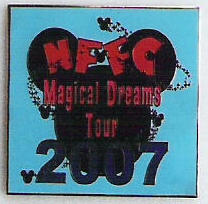Bob Welbaum: How to More Clearly Understand Disney
Page 1 of 2
How to More Clearly Understand Disney
Insight.
I believe the reason we are hard-core Disney fanatics is because we all crave insight, our own personal little peeks into the very essence of the magic. We have our particular interests, but the common denominator is we all long to better understand what happens behind the cameras, at the drawing tables, in the boardrooms,… to learn the answers to such questions as:
- Exactly how does the creative process work?
- How do theme-park attractions evolve?
- What was it like to work with Walt Disney?
This is why I belong to the NFFC, the club for Disneyana enthusiasts (www.nffc.org). I attended their convention, held at the Crowne Plaza Resort in Garden Grove, CA, July 11-15. (This annual event is now called the California Convention, since the Second Annual Florida Convention is scheduled for September 27-30 at Walt Disney World’s Coronado Springs Resort.) I’ve been going to these conventions for twenty years now, and with each one I force that door to the magic open a bit wider, learning more and more about how Disney’s unique ideas are brought to fruition.

This year's NFFC convention pin
During this year’s edition, there were two seminars in particular that I thought gave me exactly what I am seeking, and I’d like to share some highlights with you.
What was Walt Disney really like? Neal Gabler is the author of Walt Disney: The Triumph of The American Imagination (Knopf, 2007), which took him seven years to write. Unfortunately, I have not started reading it myself, but Neal gave an enthusiastic presentation that really demonstrated an in-depth knowledge of his subject. Here are just four of the points Neal made:
But here’s something that is irrefutable when you go through the material – Walt Disney was not a collaborator. Walt Disney didn’t want collaborators. Walt Disney didn’t think of his staff as collaborators. Walt Disney didn’t sit down and think “Well, now we’ll all join together, and in some kind of communitarian fashion, make these animations.�? He may have given lip service to that, and sometimes he did. But the deal is that at the Walt Disney Studio, not only was Walt Disney’s word holy writ, it was holy writ because Walt Disney was the only thing that mattered.
…So then why again were they so adamant about doing whatever Walt wanted them to do? Why did they work on Sundays when they didn’t get paid for it? Why did they work till midnight when they didn’t get paid overtime for it? Why did they work until, as some described it, the animation boards would get so hot that they would burn their arms and hands? Why did they do that? And they did it because as I said, the Walt Disney Studio was unlike any other studio or unlike any other business. The Walt Disney Studio was a cult. And it operated just like a cult. And the ‘Jim Jones’ of the cult was Walt Disney. And at the Walt Disney Studio you do whatever Walt Disney wanted because Walt Disney was god.
Neal made these two points after his formal presentation while answering audience questions:
Walt Disney, the week before Disneyland opens, is having dinner with [Ken] Anderson, and he says to Anderson, “You know, I know what’s going on around here. You guys think I don’t know, but I know everything.�? Which indeed was true, Walt Disney did know everything. He said, “ I know that there’s a lot of women out here and a lot of guys out here, and you’re away from your families cause you’re down here in Anaheim, and I know what’s happening here.�? And Walt said “I don’t understand it. I really don’t get it. It’s as if women are your hobby.�? And he says “This is my hobby.�? And he pointed at Disneyland.
There’s a wonderful line, and I quote it in the book, I think it was from Ron Miller, who, they’ve just watched, in Walt’s private screening room, To Kill a Mockingbird. And Walt says “I wish I could make a movie like that.�? And he didn’t mean, in my estimation, because it would be completely uncharacteristic of Walt Disney, ‘I wish I had the talent to make a movie like that,’ because Walt Disney believed he had the talent to do anything. This was not a man who lacked of confidence ever. I don’t think there was ever a crisis of confidence in Walt Disney’s life, ever, from the time he was a kid. I think he meant ‘I wish that Walt Disney, the entity, the figure I’ve become, the persona of Walt Disney could make a movie like that.’ And that the public would accept it, which he knew they wouldn’t. So in an odd way Walt Disney had become the prisoner of his cultural position.
All in all, it was a very informative and entertaining presentation. If Neal ever tires of writing, I think he has a bright future on the motivational-speaking circuit.
